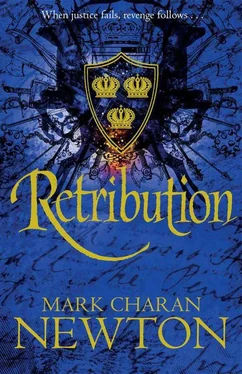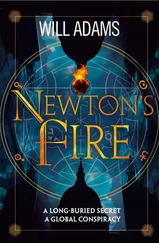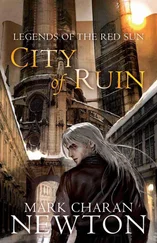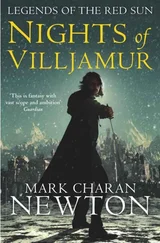Mark Newton - Retribution
Здесь есть возможность читать онлайн «Mark Newton - Retribution» весь текст электронной книги совершенно бесплатно (целиком полную версию без сокращений). В некоторых случаях можно слушать аудио, скачать через торрент в формате fb2 и присутствует краткое содержание. Год выпуска: 2014, ISBN: 2014, Издательство: Pan Macmillan, Жанр: Фэнтези, на английском языке. Описание произведения, (предисловие) а так же отзывы посетителей доступны на портале библиотеки ЛибКат.
- Название:Retribution
- Автор:
- Издательство:Pan Macmillan
- Жанр:
- Год:2014
- ISBN:9781447249412
- Рейтинг книги:4 / 5. Голосов: 1
-
Избранное:Добавить в избранное
- Отзывы:
-
Ваша оценка:
- 80
- 1
- 2
- 3
- 4
- 5
Retribution: краткое содержание, описание и аннотация
Предлагаем к чтению аннотацию, описание, краткое содержание или предисловие (зависит от того, что написал сам автор книги «Retribution»). Если вы не нашли необходимую информацию о книге — напишите в комментариях, мы постараемся отыскать её.
Retribution — читать онлайн бесплатно полную книгу (весь текст) целиком
Ниже представлен текст книги, разбитый по страницам. Система сохранения места последней прочитанной страницы, позволяет с удобством читать онлайн бесплатно книгу «Retribution», без необходимости каждый раз заново искать на чём Вы остановились. Поставьте закладку, и сможете в любой момент перейти на страницу, на которой закончили чтение.
Интервал:
Закладка:
All sorts of people had come to the court. A couple of poets could be overheard reciting aloud nearby, and I was reasonably certain there were astronomers present: one man had unrolled a chart of some sort, which appeared to show the orbits of other worlds around the sun — a relatively recent way of thinking, as was my limited understanding on the subject. There were even actors, or dancers, waiting at the far end. This collection of individuals again showed the diversity of cultures in the city of Kuvash — or, at least, within the royal palace.
Out of those standing within the throng, just how many of them knew the bishop? I wondered if he had dealings with the court as well as seeing to religious matters. As an outsider, and a newcomer to the court, it was natural that many treated me with suspicion, which could easily be perceived in their glances. It was important not to read too much into that.
Sulma Tan steered us to one side of the chamber, not too far from the sumptuous throne. On closer inspection, I noted that it was built around a centre of luscious red cushioning. The throne itself was crafted from silver, with elaborate decorative features of what looked like planets and the sun, echoing the kind of things I’d seen on the astronomer’s chart. The level of detail was staggering and it glimmered with the brightness of newly cast or highly polished metal.
Suddenly I realized what had been niggling me ever since I’d set foot in the chamber: whereas in Detrata, for example, there would be antique items, crumbling statues that indicated a long history, here absolutely everything was so very new . The statues were bright and had clearly been carved within the last couple of years; none of the metalwork had lost its newly cast vibrancy. Even the academics brought here were ready to discuss the very latest observations. Queen Dokuz was clearly a progressive monarch — or at the very least a woman who was fond of high culture. She wanted to be surrounded by the best, for people to walk among the finest offerings of Vispasia.
How, then, would she take to our details of the dismembered bishop?
I became alert to the approach of footsteps — slow, heavy boots from dozens of soldiers striking the stone floor. The rhythm was mesmeric, with at least three seconds between steps. The blue-hooded crowd turned almost in unison as men and women, garbed in red shirts with slitted puffed sleeves and white trousers, marched into the room two by two. There were ten of these ceremonial soldiers in all, though the sound of their passage suggested a far greater number.
At the rear of the entourage came four intriguing figures: two men in what I took to be flowing feminine versions of the national dress in pastel blue. They might have been the queen’s eunuchs.
But the true focus of the room was on the two ladies.
One stood much shorter than the other, and was clearly in her teens. She was surely to transform into a woman of great presence one day, though currently her demeanour suggested that she would rather be anywhere but here. She must have been Nambu Sorghatan, daughter of the queen, who strode alongside her as the vision of what her daughter would one day become. On our way here Sulma Tan had mentioned that her father, the queen’s former husband, had died a long time ago of a coughing sickness, and that his name was now rarely brought up.
The woman led the nation; one day so would the girl.
Queen Dokuz Sorghatan and her daughter each wore a gown of exquisite silk — the mother’s colour was a rich shade of purple with daedal gold stitching and bright silver buttons, while her daughter’s was an exact replica, but a few sizes smaller and in crimson. The queen was heavily made up, lending her face a pale, almost ethereal sheen, and her black hair was arranged in an elaborate, if somewhat improbable, style. A large silver crown, more like a silver laurel wreath, rested upon her head. Her daughter’s hair was much more conservatively arranged, and merely tied at the nape of her neck. I noticed that her eyes were an incredible bright-blue.
The queen broke from the group and led her daughter to the throne. With slow, measured movements, a point of ceremony rather than effort, the queen turned to sit on the throne. She did so in a manner that suggested the throne caused her some discomfort, and she raised both hands to alter the crown that appeared to sit awkwardly.
Her daughter moved around to stand on her right and the figures I’d taken to be eunuchs then moved to their position behind the throne, before turning to face the rest of the crowd.
Everyone visibly relaxed at that moment, though the tension remained thick, the room full of uncertainty. A few more people then filed into the court, until there were around sixty of us standing within the perimeter of soldiers. One of the eunuchs leaned forward to whisper something into the queen’s ear. After she nodded, he then beckoned Sulma Tan forward.
She motioned for us to follow her through the crowd and only then did I realize I had not been briefed on the correct royal etiquette. There was little need to tell Leana what to do — we were experienced enough to know that we should keep a close eye on Sulma Tan’s behaviour, and mimic her gestures where appropriate. However, it did not stop my anxiousness growing with every step.
The second secretary fell to one knee before the queen, and lowered her head, placing her forearm horizontally in front of herself. We did the same, rising only when Sulma Tan rose. These gestures seemed to please the queen.
The queen spoke without hesitation, her voice full of authority: ‘Please, to your feet. You are Detratan?’ She spoke in my native language.
‘I am,’ I replied. ‘My name is Lucan Drakenfeld, Officer of the Sun Chamber. This is Leana, my assistant.’
The queen’s gaze settled on my companion. ‘Astran’s mercy, such beautiful dark skin. How wonderful to see such variety in our humble city.’
‘I am from Atrewe,’ Leana said.
‘You are both from places of high culture.’ The queen gave a grin that almost started to crack her make-up. She possessed a wide, animated face and bright bold eyes. I estimated her age to be somewhere around fifty — her white make-up, with vibrant azure areas around her eyes, made it difficult to be certain, or indeed to read her emotions clearly.
‘We like to think so, at least,’ I replied, more to break the silence that lingered rather than to converse in a casual manner. From my experience, it often pays to let people in high positions speak first, and at some length.
If the young Nambu Sorghatan had made eye contact with me, I would have acknowledged it, but she did not. Sulma Tan extended no ceremonial greeting towards her specifically.
Queen Dokuz simply sat there, letting it be known she was watching us, for a long, drawn-out moment. I had no doubt that her spies had been discussing me, that she had sent her menials to verify the events in which I had participated. To me, it was reassuring.
‘We do not often get visitors from the Sun Chamber,’ she said eventually. ‘What a fine institution that is. I have always supported them when we queens and kings meet. Though not everyone can see it, Vispasia depends upon people like you. I understand not even every royal thinks that, but I appreciate the contribution in terms of justice. Stability leads to prosperity, yet often in times of comfort people forget that luxury of peace.’
‘Your words are kind and wise,’ I replied, somewhat relieved. ‘I’m only sad that my arrival — as it tends to be wherever I visit these days — comes under such circumstances.’
‘I have been informed about Bishop Tahn Valin,’ she replied. ‘Is it as bad as they say?’
‘If not worse.’
Читать дальшеИнтервал:
Закладка:
Похожие книги на «Retribution»
Представляем Вашему вниманию похожие книги на «Retribution» списком для выбора. Мы отобрали схожую по названию и смыслу литературу в надежде предоставить читателям больше вариантов отыскать новые, интересные, ещё непрочитанные произведения.
Обсуждение, отзывы о книге «Retribution» и просто собственные мнения читателей. Оставьте ваши комментарии, напишите, что Вы думаете о произведении, его смысле или главных героях. Укажите что конкретно понравилось, а что нет, и почему Вы так считаете.












